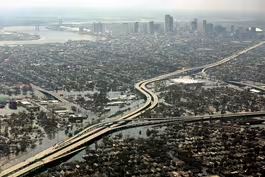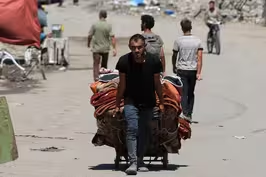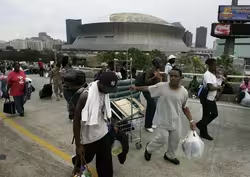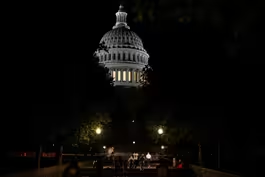
Brooks and Atkins Stohr on school shooting response
Clip: 8/29/2025 | 10m 13sVideo has Closed Captions
Brooks and Atkins Stohr on the political response to the Minnesota school shooting
New York Times columnist David Brooks and Boston Globe columnist Kimberly Atkins Stohr join Amna Nawaz to discuss the week in politics, including the tragic school shooting in Minnesota, the Trump administration's actions to remake the government and the Ukraine war continues two weeks after the Trump-Putin summit.
Problems playing video? | Closed Captioning Feedback
Problems playing video? | Closed Captioning Feedback
Major corporate funding for the PBS News Hour is provided by BDO, BNSF, Consumer Cellular, American Cruise Lines, and Raymond James. Funding for the PBS NewsHour Weekend is provided by...

Brooks and Atkins Stohr on school shooting response
Clip: 8/29/2025 | 10m 13sVideo has Closed Captions
New York Times columnist David Brooks and Boston Globe columnist Kimberly Atkins Stohr join Amna Nawaz to discuss the week in politics, including the tragic school shooting in Minnesota, the Trump administration's actions to remake the government and the Ukraine war continues two weeks after the Trump-Putin summit.
Problems playing video? | Closed Captioning Feedback
How to Watch PBS News Hour
PBS News Hour is available to stream on pbs.org and the free PBS App, available on iPhone, Apple TV, Android TV, Android smartphones, Amazon Fire TV, Amazon Fire Tablet, Roku, Samsung Smart TV, and Vizio.
Providing Support for PBS.org
Learn Moreabout PBS online sponsorshipAMNA NAWAZ: This week has seen tragedy at a Catholic school in Minnesota and a frenetic pace of actions by the Trump administration to remake government.
For analysis on it all, we turn to Brooks and Atkins Stohr.
That is New York Times columnist David Brooks and Boston Globe columnist Kimberly Atkins Stohr.
Jonathan Capehart is away.
Great to see you both.
KIMBERLY ATKINS STOHR, The Boston Globe: Good to see you.
AMNA NAWAZ: Let's start in Minnesota.
The school year had just gotten under way.
We already have a deadly school shooting; 8-year-old Fletcher Merkel, 10-year-old Harper Moyski were killed, 18 others injured after a shooter opened fire during a morning mass marking the very first week of classes at a Catholic school in Minneapolis.
I know you both have seen scenes like this.
They're so familiar now to us in this country.
So is the political debate.
Just want to play for you a bit of how we saw reactions from Vice President J.D.
Vance and Minneapolis Mayor Jacob Frey.
J.D.
VANCE, Vice President of the United States: When I see far left politicians say, how dare you offer thoughts and prayers, you need action, I don't care about your prayers, I care about what you're going to do to prevent this from happening, why does it have to be one or the other?
JACOB FREY (D), Mayor of Minneapolis, Minnesota: Of course, we're standing up with thoughts and with prayers.
But thoughts and prayers are not going to cut it.
We need a statewide and a federal ban on assault weapons.
(APPLAUSE) JACOB FREY: We need a statewide and a federal ban on high-capacity magazines.
(APPLAUSE) AMNA NAWAZ: David, from Sandy Hook to Parkland to Uvalde, nothing has dramatically changed to keep this sort of thing from happening again.
Is it too cynical to say that there's a numbness that has set in to kids being shot in school here?
DAVID BROOKS: I think people still have the capacity to be appalled by somebody who shoots their children through stainless windows.
And so I do think that.
Will there be action?
J.D.
Vance just said prayers and actions.
Well, what are the actions he's proposing?
The shooter in this case got her guns legally.
She passed through the red flag law, which they have in Minnesota, the permitting.
And so clearly more needs to be done.
Blue states should be experimenting with more stuff.
One of the things that comes up in this case is, she left a pretty big online trail.
Like, is there a way to use A.I.
to sort of find these people a little better than apparently we are, when no red flags are set off and this young person was writing all this stuff online?
And I think the thing that's most chilling to me about this particular case is not only the need for guns.
It's not only the need for mental health alertness.
But she wrote in one of her comments, this is about nothing.
Some people kill because they have some crazy ideology like the Unabomber.
She has no ideology.
The FBI now has a category of terrorists which are nihilists, people who just believe in nothing.
And we're seeing a rise -- the anarchists 100 years ago were killing people, but now we're seeing this tide of nihilism.
So I look at it as a gun problem, as a mental health problem, and really as an intellectual problem about our culture, that you have people who believe in nothing and just want to destroy.
AMNA NAWAZ: Kimberly, we reported earlier Governor Walz seems to be suggesting he's going to call a special session to try to address this.
We don't have details beyond that.
But does the Democratic response, in particular, does it feel a little more muted to you this time?
KIMBERLY ATKINS STOHR: I feel like all of it is muted.
I think that Americans who are sending their children to school to start their school year are hearing about the thoughts and prayers and these ambiguous actions that may or may not be coming, and they are gutted by that, because they know that none of that protects their children.
I think that this is not about trying to prevent the last shooting and figuring out what led to that one.
It's about, how do we change the culture in America surrounding guns?
Because this does not happen other places.
It does not happen in other countries that have much more lax gun laws than we do on the books.
This is about a society that believes that the right to carry guns is something like a religion unto itself.
And that's from messaging that comes from Republicans about the Second Amendment and how any measure that is commonsense that is meant to prevent guns from getting in the hands of people that shouldn't have them is somehow not just unconstitutional, but sacrosanct in itself.
Until we can change that, until we can loosen the grip of the gun industry, the lobby here in Washington and across states, this will not change and children will continue to die.
AMNA NAWAZ: We will see if lawmakers do act as they come back.
But I do want to take just a bit of a step back on this past week, because a lot happened.
It was not by any means a slow summer week.
There were a lot of big actions taken by the president to exert even more control over the federal government, reshape it in his vision, whether it was purging dissent at the leading health agency or from the agency that manages disaster response, trying to fire a Federal Reserve Board member, or keeping federal troops here in Washington, also threatening to send them to other cities.
Also, this week, we saw all of the Cabinet members sitting for more than three hours in a meeting essentially praising the president and his work.
Journalist Garrett Graff this week wrote that all of these small events add up to a very big shift in our country, from democracy to authoritarianism.
He said: "Something is materially different in our country this week than last."
David, do you agree with that?
DAVID BROOKS: Not really.
I don't see -- I don't look for one moment that will split the switch to authoritarianism.
I look at this is a long degradation.
And maybe there will never be one red flag moment where we think, OK, we flipped.
We're now no longer a democracy.
But the way I see it is in broader terms that, starting somewhere around 2010 or 2013, the era of global populism started.
And it happened in countries all around the world.
Our version was Donald Trump.
It might have been Viktor Orban somewhere else, Nigel Farage somewhere else, Vladimir Putin somewhere else.
But it started.
And in every one of these countries, and maybe ours faster, we have degraded democracies.
We have personalized, gutted the Justice Department, taken out rule of law or degraded -- and so it's erosion, erosion, erosion.
And my view is, if you think this is going to be over in three years, when Donald Trump leaves office, you're naive, that these historical tides, once they get going, they just keep going until they're stopped.
And so what strikes me is, why are we not stopping it?
And so the people I'd salute this week are Lisa Cook and Susan Monarez and, frankly, the gentleman from the transportation board we just saw in the last segment.
AMNA NAWAZ: Susan Monarez from the CDC.
DAVID BROOKS: From the CDC -- who are resisting.
And I had a Democratic politician call me up today and said, where's the head of the universities?
Where are the law firms?
Where are the corporate CEOs?
These three people have guts.
And they're not just leaving the office.
They're just going to stay there and resist.
And we should -- I have said this on this program multiple times.
We should be having a mass coalition of people who are willing to resist together, because it's really hard to resist alone.
And so at least we're seeing some pushback this week.
KIMBERLY ATKINS STOHR: Yes, I think that this week didn't change.
We're seeing it in a rapid pace and a lot of examples of it.
But I personally think the change, the change from the first Trump administration to the second, because I agree with you, Trumpism is broader than Trump, but he is who is ushering it in.
The big difference I think was the decision by the Supreme Court granting the president immunity for actions that he takes while in office.
Now, while that decision did not, repeat, did not bless all of the things that he's doing, it seems in his mind that it did.
And he believes that the Supreme Court will go along with any legal battle that he chooses, any push against the wording of the Constitution or federal law that exists.
He honestly seems to think he is above it.
And so far, in challenge after challenge after the challenge, the Supreme Court hasn't proven him wrong.
Will they do it finally with the Fed board, which they have already hinted that is different and that he can't just fire people willy-nilly?
I don't know.
But, so far, Donald Trump is coming out on the winning end of each one of these battles because he sees himself as invincible.
AMNA NAWAZ: I do want to get both of you to briefly weigh in on the news on the Russia-Ukraine war, because we saw diplomatic meetings today continue between members of the Trump team and Ukrainian officials.
Last week, of course, we saw President Volodymyr Zelenskyy in the White House with President Trump.
We are now two weeks post that Alaska summit between Vladimir Putin and President Trump, and the war not only rages on.
Russia is launching some of its worst attacks that we have seen on Kyiv, killing 23 people just this week.
David, has anything changed?
DAVID BROOKS: No, and I have never had any hope.
Vladimir Putin has made it clear for three years, and he's never wavered, that he wants to control Ukraine.
He wants to kick out the democratic government of Ukraine and just control Ukraine.
And guess what?
He's slowly and very bloodily winning this war.
And so why should he make any compromises?
His job was to try to split Trump off from the Europeans, to pretend to Trump that he's offering some compromises.
But he's not compromising, and he's made it clear when they say, we're going to go to the root causes, which is basically a dependent Ukraine.
And now he's highlighted that by hitting Kyiv again and again and again.
The Ukrainians, fortunately, have developed in the last week, kind of miraculously, apparently a new cruise missile that can go 300 -- or 3,000 kilometers into Russian soil.
So maybe that will exact some cost on the Russians.
But it's still a war and not a negotiation.
And that really hasn't changed.
KIMBERLY ATKINS STOHR: Yes, I agree with David.
I mean, Donald Trump definitely wants to be able to say, hey, I ended this war.
Only I could do it.
But he gravely miscalculated Vladimir Putin by inviting him onto U.S. soil and thinking that there was a deal to be struck.
There was never a deal to be struck here, and we are seeing the outcome of that.
So it was a terrible blunder that I think only empowered Putin, obviously, you see with this -- the stakes.
But it was something that Trump could not win even if he thought he could.
AMNA NAWAZ: It was a busy, consequential week.
We're so grateful to have you both here at the end of it.
David Brooks, Kimberly Atkins Stohr, thank you to you both.
DAVID BROOKS: Thank you.
KIMBERLY ATKINS STOHR: Thanks.
20 years later, a look at the legacy of Hurricane Katrina
Video has Closed Captions
Clip: 8/29/2025 | 5m 28s | 20 years later, a look at the legacy of Hurricane Katrina (5m 28s)
Cindy McCain describes dire conditions after visit to Gaza
Video has Closed Captions
Clip: 8/29/2025 | 6m 32s | WFP's Cindy McCain describes dire conditions after visit to famine-gripped Gaza (6m 32s)
Democrat warns Trump firing challenges integrity of STB
Video has Closed Captions
Clip: 8/29/2025 | 4m 58s | Democrat warns Trump firing challenges integrity of STB ahead of railway merger decision (4m 58s)
Israeli frustrations rise as war and hostages remain in Gaza
Video has Closed Captions
Clip: 8/29/2025 | 7m 54s | Frustrations rise in Israel as war endures and hostages remain in Gaza (7m 54s)
Katrina victims reflect on how the storm changed their lives
Video has Closed Captions
Clip: 8/29/2025 | 4m 42s | Katrina victims reflect on how the storm changed their lives (4m 42s)
News Wrap: Trump trying to block $5B approved by Congress
Video has Closed Captions
Clip: 8/29/2025 | 6m 32s | News Wrap: Trump trying to block $5B in foreign aid already approved by Congress (6m 32s)
What consumers can expect as de minimis exemption ends
Video has Closed Captions
Clip: 8/29/2025 | 5m 50s | What consumers can expect as de minimis exemption ends (5m 50s)
Providing Support for PBS.org
Learn Moreabout PBS online sponsorshipSupport for PBS provided by:
Major corporate funding for the PBS News Hour is provided by BDO, BNSF, Consumer Cellular, American Cruise Lines, and Raymond James. Funding for the PBS NewsHour Weekend is provided by...


















